Ahh yes, the inflation bomb is right in Ulysses's lap. Eager to see how that gets resolved.
However Ulysses does it, it can't be anything like what Sarney did. That, as I'd think you'd all agree on, was a total disaster that could have been easily prevented. Even more so if the printing presses stopped printing entirely. Now, if I were in Ulysses' place - trading my comparatively very comfortable position in the 21st century Global North for a place in the Global South - then considering the limited options available to Brazil I'd address the inflation bomb as turning over a leaf from the era of the dictatorship. Even stuff that would sound horrendous now (such as cutting government spending, the monetary policy I pointed out upthread, and even repudiating the debt) would be excused as addressing the dictatorship's legacy. I'd become an easy target for assassination for saying such stuff, and my base would be disappointed that I would not be pursuing more progressive policies and that it's just a deepening of the austerity policy minus the crushing debt, but ultimately I would see no other choice
but to do that, at least initially. Only once the inflation bomb is diffused would I then become something, for OTL comparison purposes only, more like Patricio Aylwin in Chile (with his "growth with equity" policy) or even (dare I say it) even something akin to Lula's first term and/or FHC, in order to address some of the gaps left behind from the era of the dictatorship. I'd be pressed by the international community to do all sorts of privatization, but in that case I would much rather pursue the gradualist policy that only several years later would be attempted
by India. Bringing economic stability to and taming inflation in Brazil would be an important part of my legacy along with the new Constitution, and would provide a good base for other progressives to build upon. That's just my personal opinion - others could think of something different, but given the context of Latin America at that time and the need to avoid the Lost Decade ITTL by defusing the inflation bomb, that's the only way I can see it.







